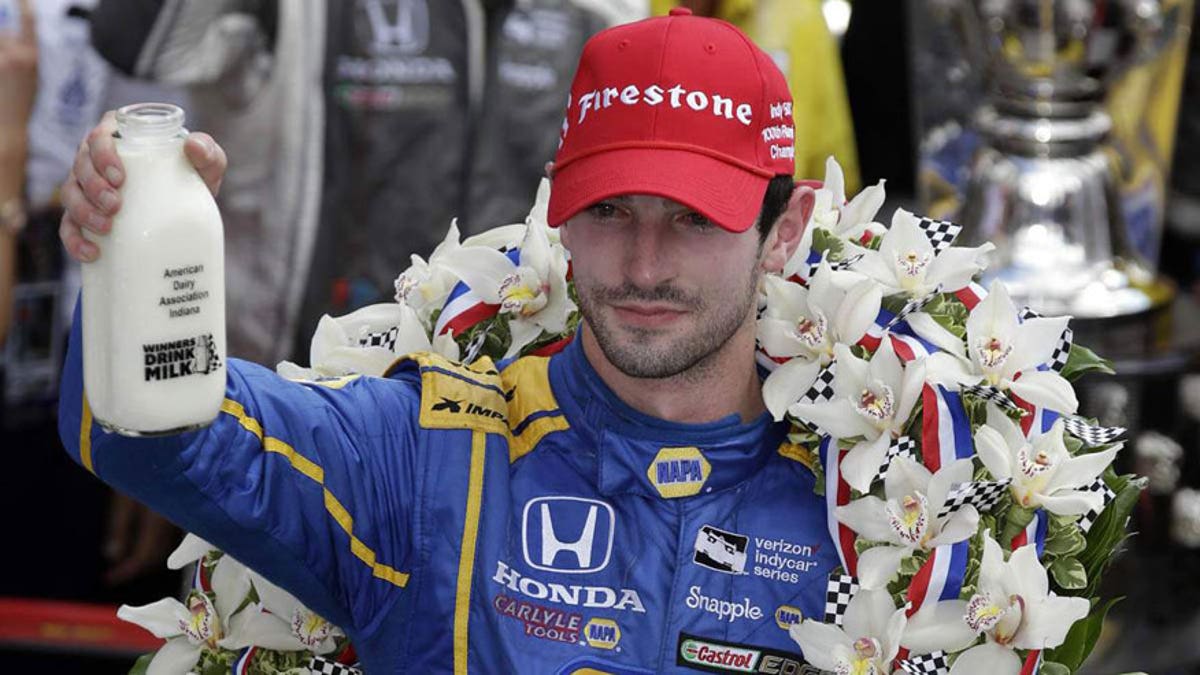
(AP)
Alexander Rossi became the unlikeliest of American racing heroes this Memorial Day weekend when a clever fuel saving strategy and a little luck allowed him to cross the Yard of Bricks while running on fumes and win the 100th running of the Indy 500 on his first try.
For the California native, who’d been living in London and pursuing his career in international formula car racing for the past several years, including a five-race stint during the 2015 F1 season, it was a homecoming he says he’ll never forget.
Rossi, who still has one foot in the F1 world as a reserve driver for Manor Racing, spoke to FoxNews.com automotive editor Gary Gastelu about his incredible win and what it’s like racing in the United States, as he continues his quest for the IndyCar championship and rookie of the year honors with the Andretti-Herta Autosport team.
GG: Now that you’ve had time to reflect on the victory, what’s it like to have your name printed in bold in the big book of American racing history?
AR: It’s pretty spectacular. Immediately after the race I didn’t quite understand the magnitude of it, and even the week afterwards. But as more time has passed I’ve watched the race back and reflected on it and it’s truly an amazing thing. I still get chills when I relive that moment in my mind. It’s something that’s very special to me, and something that will stay with me, not only for the rest of my career, but the rest of my life.
GG: Indy was just your second oval track race, and the fastest track you ever drove on. Going into it, what were your expectations?
AR: For the first practice session, I had zero expectations. I was just trying to complete the rookie orientation program and find my way around and find my feet. But then as the week of practice progressed, and we were quick, and we were towards the front, my initial goal was to be on the front row. We missed that, in part because of a strategic error in qualifying. So I knew that, even though I was starting 11th, we had a car that could be at the front and I went into the race with the goal to win. I didn’t care about the fact that I was a rookie, I knew that the car was fast enough, and that we had been strong enough for the entire month. I didn’t necessarily expect to win, but I knew that I had the equipment to get me to the front.
GG: At what point in the race was the plan hatched to start saving fuel, and when did you realize that it might actually be working?
AR: The plan came around the halfway point. We had three difficult pit stops, each slightly worse than the last, that dropped us down in the order. We were strongly in the top 10, then 28th or 29th. So we knew that in order to get track position back, we had to get creative with the strategy, and we started conserving fuel from that point. I only realized we had a shot at it on the last lap, because I was in the lead and there was only one lap to go. But at the same time I was very aware that we were short on fuel, from what we knew, we only enough to make it half way around the lap, so I didn’t actually think we’d be able to pull it off until I crossed the line.
It was a very emotional day for all of us. My strategist, Bryan Herta, had won the race on the 100th anniversary, and for us to win the 100th running, and for him to have both centennial races, was pretty special.
GG: You’ve spent most of your career overseas. Has winning Indy that changed your outlook on the sport? Reset your goals?
AR: I wouldn’t say it’s changed anything. I went into IndyCar with the intention of being a championship contender. The 500 win vaulted us back into contention after a difficult first four races where we were trying to find our feet as a team. If anything, it’s refocused us on the goal of winning the championship.
GG: What’s impressed you most about IndyCar, compared to Formula 1?
AR: The biggest thing is the engagement of the fans. I’ll be honest, there’s times where it’s pretty intense when you’re trying to do a job and there are always people around. But then you take a step back and realize those are the people that are the future of the sport, especially the young kids, and you want them to experience it and get up close to the drivers. That’s one thing Formula 1 misses. The fans don’t have an affinity with the drivers. It’s more with the team, or the brand, or the sponsors, because the drivers are so far out of reach. In IndyCar you can get to know the people, the drivers, and I think that part of it is very special.
GG: The IndyCar series has the Fourth of July weekend off. What do you have planned?
AR: Unfortunately, there’s a Formula 1 race in Austria on Sunday, July 3 that I’ll be at. But I think I’ll land in the U.S. on the Fourth of July, and hopefully be able to spend a bit of time with friends and see some fireworks.



















